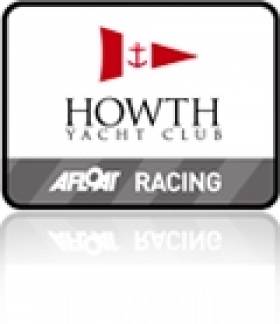Displaying items by tag: Five cruiser classes
Fresh start to Howth's Autumn League
On the Inshore Course for one-designs, it was close enough in the Etchells, with the first three boats finishing within 30 seconds and the honours going to Jay Bourke of the Royal St.George YC on 'Northside Dragon'. Simon Knowles 'Jabberwocky' and Robert Dix's 'Glance' were hot on his heels, particularly on the final leg to the finish in the Sound. Ten boats have entered the League but two didn't make the start line for race 1.
The J/24s made their first appearance as a class in the Autumn League, a week after completing their National Championships at Howth, and although the numbers were small, the competition was tight until the final beat when Fergus O'Kelly's 'Jibberish' pulled out a healthy lead on second-placed 'Scandal' (MYC), helmed by Mossy Shanahan. The new National Champion Flor O'Driscoll had the misfortune to partly sail the wrong course and although he fought back well, it wasn't enough to trouble the front two.
The biggest fleet in the entire event is the Puppeteers with 23 boats but inevitably the leaders were familiar ones at the head of this competitive class. 'Harlequin' (Clarke/Egan) had just 23 seconds to spare over national champion Garret May on 'Ibis' while 'Mojo' (Stanley/Callen) was about the same distance behind in third. On handicap, 'Gepetto' (Ed O'Reilly) got the nod by a narrow margin over 'Haemoglobin' (Mullen/O'Dea).
The small Squib fleet was dominated by 'Kerfuffle' (Craig/Raune) and, 3 minutes behind, 'Shadowfax' (Phil Merry) to such an extent that they also finished first and second respectively on handicap while Emer Harte's 'Puffin' had to settle for third on the water.
Ten Seventeens started the race but only nine finished with HYC Sailing Secretary Brian Turvey and his crew on 'Isobel' suffering a broken mast at a time when they were challenging at the head of the fleet. The honours instead went to 'Rita' (Lynch/Curley), a minute ahead of Ian Malcolm's 'Aura' and the 17s' champion Roddy Cooper in 'Leila' in third. Perhaps a little surprisingly, Peter Courtney's 'Oona' was back in fourth slot.
Over on the Offshore Course for Cruiser Classes, Stephen O'Flaherty elegant 'Soufriere' took line honours but when the handicaps were calculated was relegated to the bottom end of the 9-boat fleet while 'Storm' (P.Kelly) and 'Tiger' won on IRC and ECHO respectively. Ross McDonald's 'Equinox' took 3rd and 2nd on the two handicap systems.
A minute separated the top five finishers in Class 2 and while Dave Cullen's 'King One' pipped 'Superhero' (Byrne/Banahan) by just five seconds on the line, it was 'Dux' (Anthony Gore-Grimes) who took the IRC honours in the 20-boat fleet. 'C'Est la Vie' (Flannelly & others), so impressive in last year's League on ECHO, maintained their performance levels to win again in that division, this time ahead of 'Maximus' (P.Kyne).
A smaller than usual Class 3 fleet saw Vince Gaffney's 'Alliance' again dominate matters on the water, heading 'Holly' (Basil McMahon) and the 11 other boats to win on IRC. Third was Malahide visitor 'Tobago' (Ray & others), a result good enough to earn them success on ECHO, just ahead of clubmates 'Shenanigans' (Douglas/Keane).
In the White Sail class 4, Colm Bermingham's 'Bite the Bullet' was third on the water behind 'Flashback' and 'FanatiX' but had done more than enough to win on both handicap systems. 'FanatiX' (R.Fanning) and 'Trinculo' (M.Fleming) were the runners-up on ECHO and IRC respectively. Class 5, the other non-spinnaker grouping, was led home by Harry Byrne's 'Alphida' who won on IRC while on ECHO, it was the Toomey's 'Harmony' which emerged on top.
The 6-race Autumn League continues with race 2 next Sunday 26th.






























































